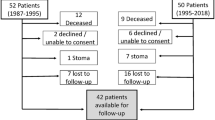PURPOSE: A significant proportion of patients with slow-transit constipation have abnormal small-bowel motility. It is unclear whether abnormal small-bowel motility indicates worse results after surgery for slow-transit constipation. We studied the results of colectomy with ileorectal anastomosis in patients with normal and abnormal antroduodenal manometry findings. METHODS: Seventeen, consecutive patients who had been referred for intractable constipation and who were found to suffer from slow-transit constipation underwent subtotal colectomy. All patients underwent a set of diagnostic investigations, including whole gut transit time, anorectal manometry, antroduodenal manometry, electromyography of the anal sphincter, balloon expulsion test, and defecography. Patients were followed up after five years. RESULTS: Patients’ median age at the time of the operation was 46 (range, 23–70) years, and the median duration of constipation was 31 (range, 11–65) years. One patient died 21 days after the operation. Three patients developed intestinal pseudo-obstruction after the operation, and two of these died during the follow-up period. Fourteen patients were available for follow-up after a median of five (range, 4–7) years. Bowel frequency was significantly increased from a median of 0 (range, 0–2) times per week to a median of 30 (range, 10–102) times per week after surgery (P < 0.001). The incidence of abdominal pain decreased from 94 to 43 percent. Seven of 13 patients (54 percent) continued to have bloating. At long-term follow-up, 12 of 14 patients (86 percent) reported that they had an overall improvement after surgery, despite continuing pain and bloating in a significant proportion of them. The outcome of surgery was good or excellent in seven of seven patients with normal findings on antroduodenal manometry, but only five of nine patients with abnormal manometry findings attained a good result after surgery. We found a trend (P = 0.09) toward better long-term results after surgery for slow-transit constipation in patients with a normal antroduodenal manometry before the operation.
Similar content being viewed by others
Author information
Authors and Affiliations
Corresponding author
About this article
Cite this article
Glia, A., Åkerlund, J. & Lindberg, G. Outcome of Colectomy for Slow-Transit Constipation in Relation to Presence of Small-Bowel Dysmotility. Dis Colon Rect 47, 96–102 (2004). https://doi.org/10.1007/s10350-003-0016-7
Published:
Issue Date:
DOI: https://doi.org/10.1007/s10350-003-0016-7




